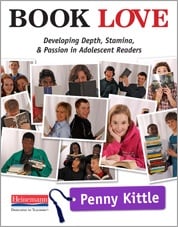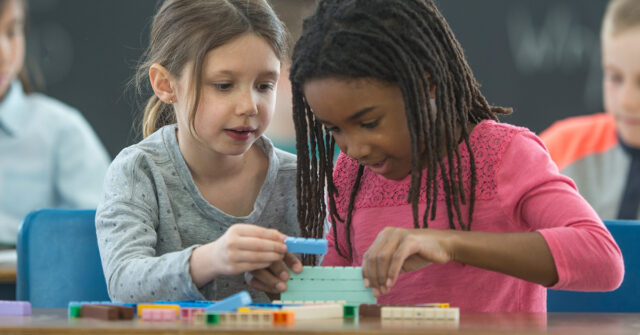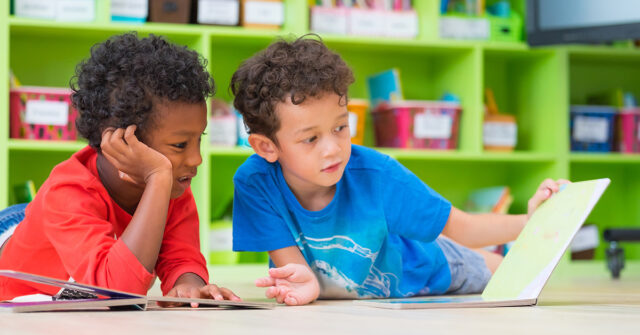
The following is adapted from Book Love by Penny Kittle.
I stood in a most wonderful bookstore in the Memphis airport one evening inhaling the strong scent of Bar-B-Q that permeates the place. On maple bookshelves softly lit by spotlights, I came upon a collection of animal books, not just The Art of Racing in the Rain, by Garth Stein, and A Dog’s Purpose, by Bruce Cameron, but Cassius: The True Story of a Courageous Police Dog, by Gordon Thorburn, which explores the scenting capabilities of police dogs that help solve crimes. There were books about training birds, the history of zoos, and endangered species. I thought of current students who would enjoy each title. This intriguing collection was placed directly across from classics recommended by people who worked in the store. There was a shelf of new fiction, one of psychology and self-discovery, and a section for business books. The store went on and on. You know: a book for anyone who might wander through this place. It was hard not to pick them up, hard not to stuff my suitcase even fuller. (I did, in fact.) But I also twirled around the room for a moment and imagined clearing out the center shelves in the store and putting in tables, writing notebooks, and students. Every classroom should have a similar celebration of reading. We need books for every reader, recommended by readers, shelved by interests, inviting browsing.
When I speak to teachers about leading readers, they want a place like this, and I want it for them. Many contact me after bargaining with their principals and colleagues to set up classroom libraries and support independent reading. Jason BreMiller wrote, “I was skeptical at first at the thought of my students really digging deep to explore books and to create their own reading lives. But what I’ve found, to my great happiness, is that they have; they do. The bulk of my students have thrown themselves into their independent reading projects with verve, as if they’ve been waiting for this opportunity all along. For many, it’s returned them to a time in their lives when the simple power and joy of stories was alive for them. They give book talks and listen attentively to each other's reading experiences. They write reflectively about how their books move them. Freed from the imposition of having to read books they haven’t chosen, they bring a refreshing bout of honesty to their thoughts about these books. Mostly, though, they’ve read books—a cause for celebration both amongst the students and their growing list of texts-finished, and for me, their teacher, who has observed from afar the unconscious, often subtle (but clear-as-day!) literacy benefits they’ve made by reading more than they have ever read before. Many of my students consider themselves readers now and have built a momentum that will propel them into a life of reading.” Kristina wrote, “I left your [UNH summer school] class armed with great ideas and a ton of passion and shared it all with my principal, who gave me $300 for books. With that, a lot of my own money, and a ton of book suggestions from you, I created a classroom library. It’s no surprise that my kids are reading like crazy. Even my study hall kids who see the books are taking advantage of them. Recently, two other teachers decided to jump on board. Armed with my reading rate charts and student essays, we approached our principal, who agreed to give us EACH a THOUSAND dollars toward a classroom library for next year!”
My heart expands with stories like these.
But the truth is, as budgets have shrunk, books and libraries and school librarians have been cut in far too many schools. Books can have an incredible effect on children’s lives, yet there’s only one book for every three hundred kids living in poverty in the U.S. (Reading Is Fundamental). I believe every child in America needs access to books that will keep him or her turning pages, racing to the end, discovering new ideas, and learning to understand the diversity in our world. I believe all children deserve books they can and will want to read and teachers that will guide them to improve as readers. We need access to books from every corner of the world and from every field of study. Students should have access to all the current award winners in literature and to the wide range of genres they will read in the future. Every classroom should have hundreds of books to inspire curiosity, hope, and vision for the future.
The Book Love Foundation is a nonprofit organization with one goal: to put books in the hands of teachers of teenagers. We seek passionately committed teachers who will aim instruction toward increasing volume, stamina, and joy in reading in middle and high school.
We can change the story of reading.
We have to.
Every child. Every year. Every classroom.
Book love—pass it on.
Explore additional Reading instruction resources here.
Penny Kittle teaches freshman composition at Plymouth State University in New Hampshire. She was a teacher and literacy coach in public schools for 34 years, 21 of those spent at Kennett High School in North Conway. She is the co-author (with Kelly Gallagher) of Four Essential Studies: Beliefs and Practices to Reclaim Student Agency, as well as the bestselling 180 Days.
Penny is the author of Book Love and Write Beside Them, which won the NCTE James Britton award. She also co-authored two books with her mentor, Don Graves, and co-edited (with Tom Newkirk) a collection of Graves’ work, Children Want to Write. She is the president of The Book Love Foundation and was given the Exemplary Leader Award from NCTE’s Conference on English Leadership. In the summer Penny teaches graduate students at the University of New Hampshire Literacy Institutes. Throughout the year, she travels across the U.S. and Canada (and once in awhile quite a bit farther) speaking to teachers about empowering students through independence in literacy. She believes in curiosity, engagement, and deep thinking in schools for both students and their teachers. Penny stands on the shoulders of her mentors, the Dons (Murray & Graves), and the Toms (Newkirk & Romano), in her belief that intentional teaching in a reading and writing workshop brings the greatest student investment and learning in a classroom.
Learn more about Penny on her websites, pennykittle.net and booklovefoundation.org, or follow her on Twitter.



